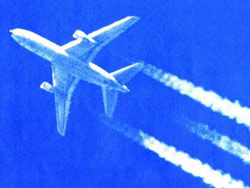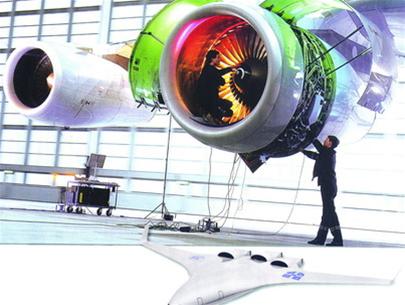'Green' plane
Aircraft can affect the climate because using kerosene oil should release toxic gases, contributing to promoting the greenhouse effect. In the future, this situation will change.
A tourist flying round Paris - New York will pour into 2.5 tons of CO2, equal to the amount of carbon emitted by the person on the ground for five months.

Environmental aircraft: Wing type that can be patted in the air to reduce noise and reduce fuel consumption (Photo: TTO)
On the world level, airplanes are less harmful than cars. In 2000, the amount of CO2 emitted by the aircraft was 664 million tons, accounting for only 2% of the carbon emitted by the whole planet. However, the problem is that air transport is increasing every day. An average of 2 billion passengers travel by air every year. It is expected that by 2050, this figure will reach 9.5 billion. Consequences: 43 more years of CO2 due to air emissions into the atmosphere will triple by now.
Since December 2006, the European Commission has issued a system of emissions quotas for airlines flying in the skies of European Union countries. The commission also requires aircraft manufacturers to develop more environmentally friendly technologies. Many manufacturers are developing environmentally friendly engines. The goal by 2015 is to produce less than 2 times less CO2 emissions.
Currently, for every passenger traveling 100km, the plane burns about 3.5 liters of kerosene. This number will be reduced to 2.9 liters for Boeing 787 or Airbus A380 aircraft. Reducing fuel consumption means reducing emissions.
For many years, machines that do not use kerosene have also been studied such as Bertrand Piccard's Solar Impulse engine (using solar energy) or a roller coaster from Boeing (using fuel cells). As expected, these new products will be tested in 2008.

Clean engines: ' synthetic kerosene ' produced from plant or natural gas waste products (Photo: TTO)
Snecma of France tested ' aircraft oil ', in which bio-oil produced colza for 30%. Boeing said it would send a B747-400 to test with a similar fuel mixture next year.
So far, it is not possible to use 100% biofuel for aircraft because the fuel from vegetable oil on the market today will be frozen at an altitude of 11,000m, when the temperature falls below 42 o C. So the studies focused on the ' synthetic kerosene ' produced from plant or natural gas waste.
SWITZERLAND
- The probability of an aircraft having an accident is 0.00001%
- Why do we get green tea?
- 2010: Year of green technology
- Why is the aircraft interior mostly green?
- Video: Answer the biggest mystery about the toilet on the plane
- What will an airplane look like when it comes to a
- How can the plane fly in the sky?
- Why is the plane most afraid of hitting a bird?
- How did a piece of tape damage 70 passengers on the plane?
- Read the chef's talk on the plane to know what food you should not call
- Rear seat is safer when the plane falls
- Getting on the plane first can be harmful to your health
 Is the magnetic North Pole shift dangerous to humanity?
Is the magnetic North Pole shift dangerous to humanity? Washington legalizes the recycling of human bodies into fertilizer
Washington legalizes the recycling of human bodies into fertilizer Lightning stone - the mysterious guest
Lightning stone - the mysterious guest Stunned by the mysterious sunset, strange appearance
Stunned by the mysterious sunset, strange appearance Chinese hypersonic aircraft prototype reaches Mach 6 speed
Chinese hypersonic aircraft prototype reaches Mach 6 speed  NASA funds $11.5 million in research on future aircraft
NASA funds $11.5 million in research on future aircraft  AI system helps aircraft 'cope' with turbulence
AI system helps aircraft 'cope' with turbulence  Supersonic drone with speed up to 6,174km/h
Supersonic drone with speed up to 6,174km/h  NASA tests X-59 supersonic aircraft engine for the first time
NASA tests X-59 supersonic aircraft engine for the first time  Scientists plan to turn dead birds into drones
Scientists plan to turn dead birds into drones 